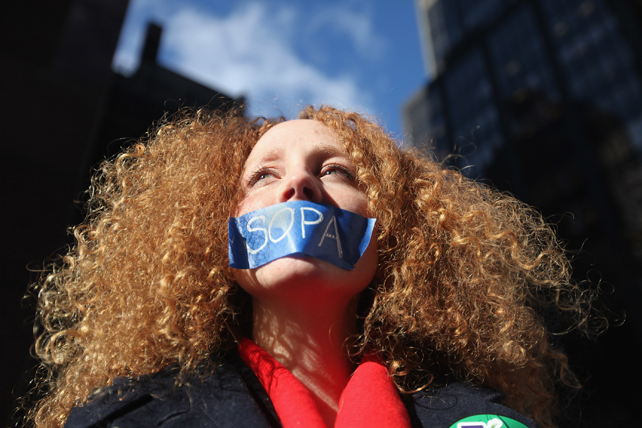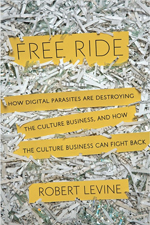To understand why “the Internet community” isn’t up in arms over the new cyber security bill, you have to follow the money.

According to the blog-and-Twitter hive mind, a kind of “Internet spring” blossomed early in 2012. On January 18, major websites including Wikipedia, “went dark” to protest SOPA (the Stop Online Piracy Act), and Google blacked out its logo and explained its objections to the bill in an official blog post. The threat of online censorship--rooted in reality but grossly exaggerated--generated a wave of calls and emails to Congress that proved more powerful than a push from the media companies and artists organizations that supported the bill. When SOPA died, pundits declared “the Internet community had spoken.”
But that’s not who spoke the loudest.
 It’s not worth mourning SOPA, a sprawling bill full of vague definitions that made it nearly impossibly to fairly enforce (although it also contained some good ideas and its Senate counterpart was less problematic). But what's often misunderstood is that Internet companies pushed against the bill as hard as media companies lobbied for it. That's mostly because bill would have given online companies more responsibility for copyright infringement, or “sharing” as well-funded startups like to call it. When you consider Google's recent disclosure that it spent more than $5 million on lobbying in the first quarter of 2012 alone, the real reasons for SOPA's abrupt death start to come into focus. That figure doesn’t count the money Google gave to groups that opposed the law--or the space it devoted to the issue on its home page, the most valuable piece of online real estate in the world. Say what you will about the lobbying power of media companies, but NBC Universal didn’t run a pro-SOPA crawl on Sunday Night Football.
It’s not worth mourning SOPA, a sprawling bill full of vague definitions that made it nearly impossibly to fairly enforce (although it also contained some good ideas and its Senate counterpart was less problematic). But what's often misunderstood is that Internet companies pushed against the bill as hard as media companies lobbied for it. That's mostly because bill would have given online companies more responsibility for copyright infringement, or “sharing” as well-funded startups like to call it. When you consider Google's recent disclosure that it spent more than $5 million on lobbying in the first quarter of 2012 alone, the real reasons for SOPA's abrupt death start to come into focus. That figure doesn’t count the money Google gave to groups that opposed the law--or the space it devoted to the issue on its home page, the most valuable piece of online real estate in the world. Say what you will about the lobbying power of media companies, but NBC Universal didn’t run a pro-SOPA crawl on Sunday Night Football.Google spends so much on lobbying that it’s hard to celebrate with a straight face the people-power that supposedly slayed SOPA. That $5 million--for just one quarter--represents a 240% increase from the same period last year. That’s more than the official lobbying budget of the MPAA ($570,000 for the same time period), the RIAA ($1.67 million), or media companies like Disney ($1.3 million) or News Corp. ($1.57 million). It’s more than Microsoft ($1.79 million), Facebook ($650,000), Amazon ($650,000), and Apple ($500,000) combined. It’s even more than Exxon Mobil ($4.17 million), which doesn’t have a cool, catchy motto like “Don’t be evil.”
Google spends so much on lobbying that it’s hard to celebrate with a straight face the people-power that supposedly slayed SOPA
Following the money is important since so many activists crowed about how “the Internet community” resisted the power of corporations. Most neglected to mention that much of this activity was funded by another powerful corporation, as well as the venture capitalists that count on a lawless web to turn companies like Pinterest into rich IPOs. In November, the Open Congress blog ran a post about “Why SOPA and PROTECT-IP Are So Hard to Kill,” suggesting that the entertainment industry spent many times more lobbying for the bill than technology companies pushing against it. While media companies almost certainly did spend more on the issue--unfortunately, it’s almost impossible to figure out what companies spend to lobby for or against a particular bill--the post grossly exaggerated the difference by including in the pro-SOPA column all of the spending by the U.S. Chamber of Commerce. The Chamber did a lot of the heavy lifting on SOPA, but the Chamber also lobbies on dozens of issues that have nothing to do with SOPA or technology. It's worth noting in this context, too, that the Open Congress blog, which detailed the entertainment industry's massive support of SOPA, is funded by the Sunlight Foundation, whose board includes former Google lobbyist and White House staffer Andrew McLaughlin and tech venture capitalist Esther Dyson.
On Google’s end, its $5 million doesn’t include money it gives to technology trade groups like NetCoalition and CCIA, which played their own parts in stoking the fury against SOPA. On December 29, Markham Erickson, the executive director of NetCoalition, told CNet that “there have been serious discussions” about major companies blacking out their websites. (Three weeks later, the organization minimized its role, telling the New York Times that “The Internet responded the way only the Internet could.”) And lawmakers had 5 million reasons to attend the NetCoalition’s Capitol-building briefing on SOPA the day after the blackout.
Since lobbying disclosures only measure money spent on formal “big-L” lobbying, they don’t count the donations Google makes to universities like Stanford, which held a panel on “What’s Wrong With SOPA” that didn’t bother to present the opposing point of view. Or the cash it spends hiring consultancies like Engage, which builds online political campaigns like DontCensorTheNet.com. (Engage says it works for Google on other issues and that staffers there put together an anti-SOPA campaign on their own time.) Or the money Google gives to groups like Public Knowledge—quoted by the New York Times as being sympathetic to Google’s plight in Washington in a story that didn’t mention the financial connection.
To get a sense of how effective the SOPA protests would have been without the support of technology giants, consider the debate over CISPA (the Cybersecurity Information Sharing Act), if you’ve even heard of it. From a civil liberties perspective, the bill is far more worrying than SOPA, and some of the same digital rights groups are against it. But the subject hasn’t generated nearly as much controversy, at least in part because Facebook supports it and Google is said to do so, although the company has not revealed its position. So much for transparency.
The new digital activism might be best summed up by a January 18 anti-SOPA demonstration in New York, an event organized by the local trade group New York Tech Meetup and Andrew Rasiej, who has helped politicians raise money from technology companies and championed their interests in Washington. He got right to the heart of the matter, calling SOPA “an unprecedented attack on the future of our industry.” Then he led the crowd--many of whom work in that very same industry--in a chant of “This is what democracy looks like.”
At the moment, unfortunately, he’s probably right.
 Robert Levine is the author of Free Ride, which Businessweek found “timely and impressive” and the New York Times Book Review called “a book that should change the debate about the future of culture.” He has been the executive editor of Billboard and a features editor at Wired and New York, and he has contributed to Vanity Fair, Rolling Stone, and the New York Times. He attended Brandeis and Northwestern University’s Medill School of Journalism. He covers the culture business from New York and Berlin. Follow @RobertBLevine_ on Twitter.
Robert Levine is the author of Free Ride, which Businessweek found “timely and impressive” and the New York Times Book Review called “a book that should change the debate about the future of culture.” He has been the executive editor of Billboard and a features editor at Wired and New York, and he has contributed to Vanity Fair, Rolling Stone, and the New York Times. He attended Brandeis and Northwestern University’s Medill School of Journalism. He covers the culture business from New York and Berlin. Follow @RobertBLevine_ on Twitter. [Top Image: Getty Images]
ICT4PE&D
No comments:
Post a Comment
Thank's!